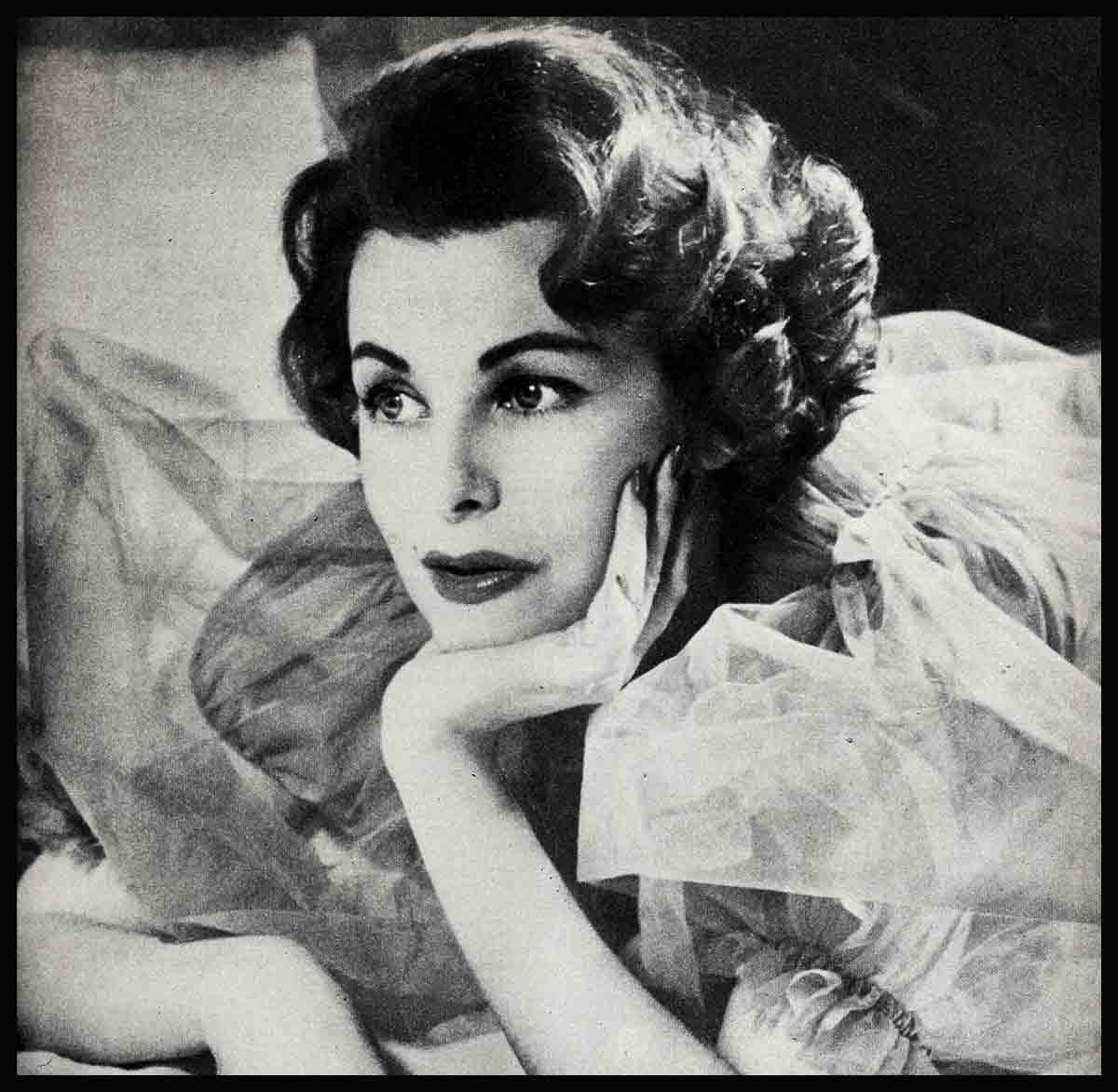
How To Handle Men—By Arlene Dahl
I believe in being happy—and what girl can be happy without a man in her life? Just as happiness shouldn’t be left to chance, or hope, so having a man in your life shouldn’t be left to chance or hope either. A girl plans how to look from the day she’s born. She studies toward it, plans toward it, diets toward it, even saves money toward it.
But there’s nothing like romance for happiness-insurance. Girls have to have love by the same law of necessity that gardens have to have rain.
There is a bloom on a woman that comes from love such as she can not gain in any other way. And I’ll whisper you something else I know there is a bloom on a man that comes from love, too. And he needs love, just as much as we girls do.
This being the case, I think the rules for handling men ought to be taught us even before we are taught anything like alphabets, or telling time, or even how to spell cat.
But the rules aren’t taught us. Some girls, and especially some girls’ mothers, act as if attempting to understand men is not quite nice. Their attitude is that we ought to be able to bring men to our feet by the mere fact of our existence. Well, maybe that worked when Knighthood was in Flower, when there were two hundred men to every woman. But these days, when the figures are practically reversed, it’s like trying to sell frozen food lockers at the North Pole.
Most of us girls have to work out the rules for man-handling all by ourselves, and sometimes the hard way, via heartbreak. But this much I know and for sure; every man you ever get to know well, teaches you at least one good rule for handling all other men. From the first man I ever loved—my father—to the latest man in my life—Fernando Lamas—I have in every instance learned some one thing about the male.
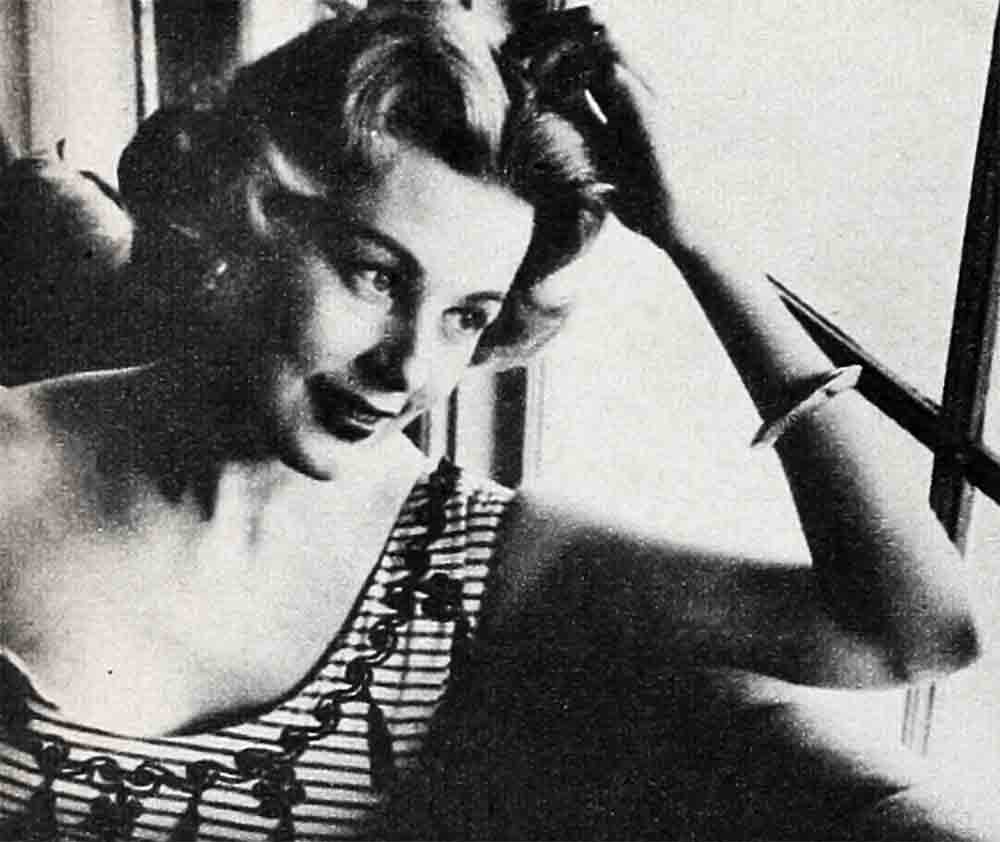
While every man is different from every other man, just as we girls are different from one another, certain things attract all of them. The trick is to find out what.
My father taught me my first lesson about men. He taught me the hard way. With a hairbrush.
I was seven years old and having a temper tantrum. I had never had such a thing before. I didn’t have to, because until that particular evening I had got everything my little heart desired.
I was an only child, born and brought up in Minneapolis, Minnesota, and I was indulged beyond belief. My parents were young and fun-loving, and everywhere they went they took me. Picnics, driving, boating, skating—whatever they did, I did, too. The only thing that kept me from being impossibly spoiled was that they loved me so much I immediately realized I could make them love me more by being very good. Besides, that way I could do almost exactly what I pleased, since what pleased me pleased them.
That was, until this one un-enchanted evening. I was about to be a flower girl at a wedding, and for this, my mother had gotten me a lovely, full-length satin dress. It went straight down to the floor, and I just couldn’t wait to wear it.
But this special night, my parents were going out to a formal dinner, and when I saw them, so glittering in their evening finery, I decided I wanted to get into the act and wear my flower-girl dress. But when I asked them to take me with them, my father said, “No.” The more I begged and pleaded, the more he said, “No,” very kindly but firmly explaining to me why a child of seven was not wanted at a formal dinner table.
Instead of listening to these facts of social life, and learning something good thereby, I began screaming. The more I screamed, the angrier I got. Until that hairbrush hit me.

I had literally never been spanked before. I stopped my screaming out of sheer shock, but my father didn’t stop wielding that hairbrush. It hurt, of course, but that hurt was nothing compared to the hurt my dignity and pride suffered. When he had finished, my father righted me, pushed me into my room and closed the door. “I expect you to be completely quiet and asleep when we get home,” he said.
We never mentioned that episode afterward, my father and I, but I learned my first rule of handling men from it: a girl can’t impose her will on a man, by direct methods. If you want men to do things your way, be subtle about it. The method to get your own way is to let them think they are getting theirs. And never, never make scenes! It drives them mad—and away from you, just as it did my father that evening.
The next “man” I learned from was all of ten years old, and I was nine. He used to hang around outside our gate, waiting to walk to school with me, or he’d hang about my classrooms, waiting to walk home with me. I was at the stage where I had two girls, of my own age, who were my “intimate friends.” You know that stage. You think boys are pretty terrible. But your “intimate girl friends”—my, how very special they seem to you! You ex-change the most unimportant “secrets” and giggle and whisper about the silliest nonsense. I was actually flattered by this boy’s devotion, but I pretended I was bored, just as my two girl friends pretended they were bored by the boys who tagged after them.
Then there came the afternoon when I invited that boy into our house. I did this because I was sorry I had been snubbing him so unmercifully. This taught me the wisdom of changing pace with a man. If you rebuff a man on one thing, give in—on another.
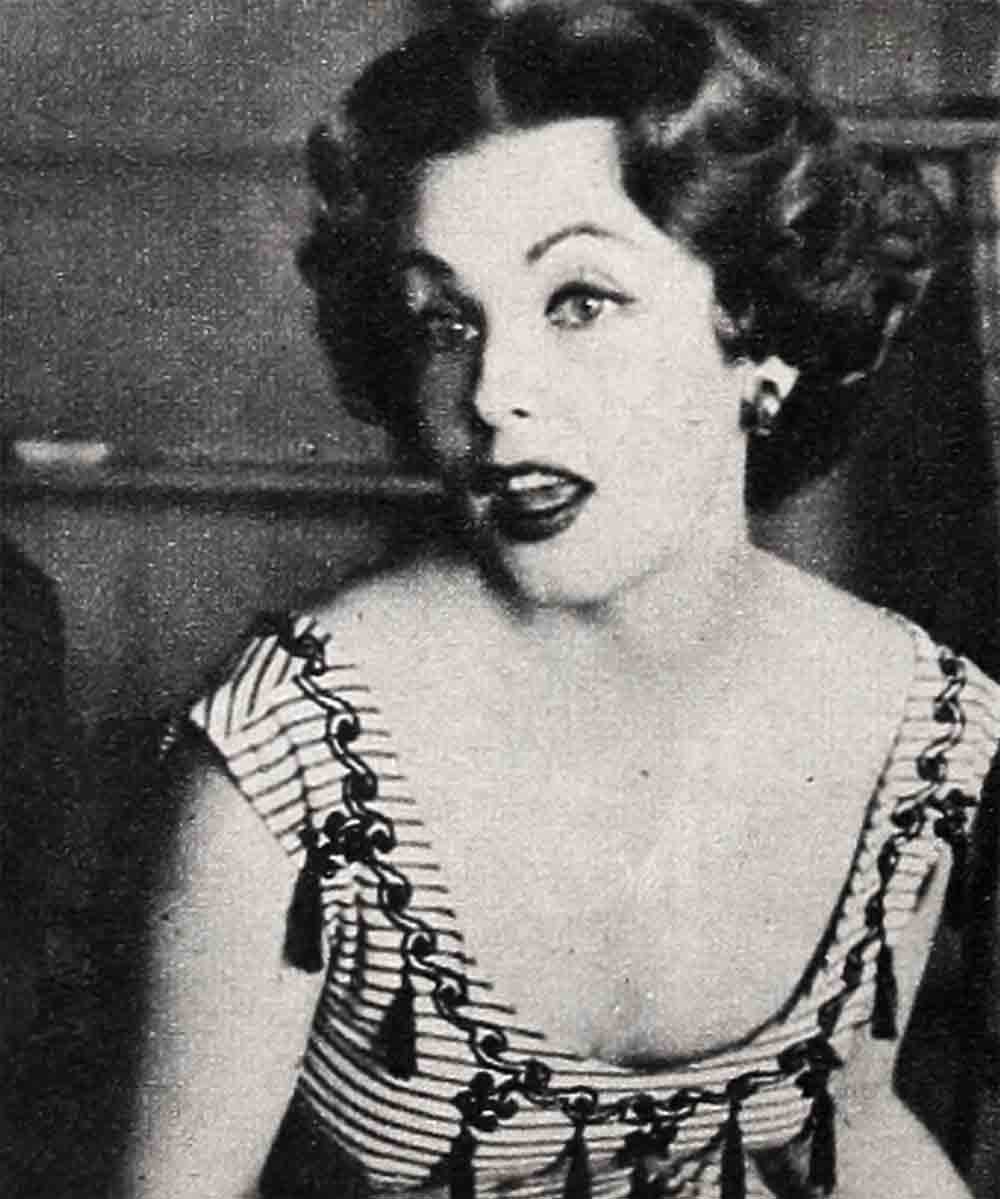
This puts you, as a girl, in a beautiful spot. The boy is not quite sure of you—and he is held by you because of that very uncertainty. He hasn’t quite captured you—and he thinks that perhaps if he sticks around, he eventually will.
But on this special afternoon, and by way of showing hospitality, I asked my “beau” to have a piece of cake which I had baked that afternoon, a little earlier. It was my first three-layer cake, with a cooked frosting, and I was proud of it. It was called, I remember, a Cinderella cake.
My boy friend ate it ravenously. The next day he brought me an Indian ring that had a chip diamond in it. Thus I learned, with practically no effort at all that being a good cook is a very great asset! Later, when I was fourteen, my mother entered one of my cakes in the State Fair and I won a prize.
But by then I was in love, really in love for the first time. It had begun when I was eleven and lasted until I was sixteen. And it was always unrequited.
He was much older. That is, he was four years older, which is a lifetime in your teens. I met him at a meeting of “Job’s Daughters,” a society to which my mother had belonged as a girl. I was very impressed that he belonged to De Molay.
He was the first boy who ever kissed me on the lips. Oh, I’d had those “post office” kisses that land on your ear, and those grabbed kisses that hit somewhere between your nose and your neck—but this was real. We stood on the porch of my house, and it was late in the evening—all of ten o’clock. It was also my sixteenth birthday. I felt his lips on mine, and his arms around me, and it surpassed any moment I had ever known.
I was without pride around him. He would call me for dates at the last moment and I would always go wherever, whenever, he asked.
Then his terrible accident happened. It was the night before Hallowe’en, for which we had a date. He was in his school dormitory engaged in a pillow fight. One of the fellows hit him with such force that he fell and hit his head on the edge of a chair. The glasses which he wore were splintered in his fall, and one of the splinters went into his eye.
For days, while I wondered whether he would see or not, I could neither eat nor sleep. Then the verdict came. He would see, but he had to lose one eye.
Until this time he had been a laughing, outward-going, popular boy. He changed into a recluse. If he would have let me, I would have married him, and devoted my life to him but he wouldn’t even see me. I wept. I prayed.

I carried that torch for five long years. Meanwhile I left home and went to Chicago to become a fashion model and assistant buyer at Marshall Fields’. I turned from the wholesome Scandinavian type I had been into a slimmer more sophisticated gal. I had quite a few dates but none of them meant anything to me, until I met a college man.
He was a student at Northwestern, and as I look back on him, I realize that he was a darling, and that I treated him rather badly. Because I let myself become engaged to him. I became engaged on the rebound. I was trying to stir the jealousy of the boy back home, or, at least, to warn him that this, if ever, was a last chance for him to make me his wife.
He didn’t take the chance. He didn’t even answer my letters.
So this was the thing the boy back home finally taught me about handling men. Give up pursuing if you see the pursuit is doing you no good. You may give all the love of which you are capable. You may lose all pride. You may try to fit your every mood into his every mood. But if he does not really want you this will have no more effect on him than tears running down a window pane. When a romance is over, let it end—completely and with dignity. And the other thing I learned from this experience was that you can mistake friendliness and even your own kindness for love.
This latter mood applied to the college man I was engaged to. Because I didn’t want to hurt him, because I was grateful to him for being in love with me, I almost married him. But finally I had to be as cruelly honest toward him as the other boy had been toward me. I left Chicago, so that there would be small chance of our seeing one another again. I went to New York and became a photographic model and stage actress.
But do remember these rules: Before you get too interested in any man, be sure his interest in you is genuine. And before you marry any man, be sure you are in love with him, not merely flattered by his being in love with you. You can’t handle your man or your life in terms of happiness for either one of you until you are sure you have the right answer to both these situations.
In New York I met a very important orchestra leader. Up until then my dates there were merely escorts. I was vague as to what I really wanted to do with my life. Emotionally, I had been so hurt by my lost love that I wanted no other.
This man encouraged me to think seriously about a career as an actress. The most important thing about handling men that I learned from him was that men like to help ambitious girls. They enjoy giving advice and being listened to, looked up to, admired. So let a man see that he is being an inspiration to you. There is so much talk about a woman inspiring a man. This is good, too, but in your man-handling I think the former is actually wiser.
It was Warner Brothers who brought me to Hollywood for “My Wild Irish Rose.” They made me put on ten pounds for the role, and I looked like the little Minnesota girl I had been originally. And what might have happened to me if I hadn’t met Sir Charles Mendl, I don’t know. For Hollywood is very worldly and sophisticated, and there are many pitfalls for the naive.
Sir Charles was older than my father, and he and his wife Lady Elsie Mendl became deeply interested in me. Through them I learned so much about cosmopolitan society and its stimulations and the value of good friendships.
We women need to be needed—but men need to be needed by women, too. This is true not only in love but it is a necessary ingredient for true friendship. I consider this one of the most important lessons I have learned from men. It was a lesson I learned from a man early in my motion picture career. I learned to respect his wisdom and his judgment early in our relationship. I took all my problems to him. None of them was too small or too unimportant for his undivided attention.
Then, for the first time since I was eleven, I fell in love. I looked up one evening at a party and saw a Greek god. He was tall, broad-shouldered, with a handsome, sensitive face. Dimly, I heard the hostess saying, “Miss Dahl, may I present Lex Barker.” What I said or did the rest of the evening I haven’t the dimmest idea.
Looking back now, so many months after Lex and I have been divorced, I often wonder what would have happened if Lex had not been sent to Africa on location just at that time. Or perhaps I might better say what would not have happened.
I think now, that if Lex had stayed right in Hollywood, we might have had a quick flirtation during which we would have discovered how incompatible we were. It would have saved so much heartbreak.
But at the beginning, we became impossibly romantic and idealistic, because our love affair was conducted by correspondence. We could write all our dreams to one another, and not have any of them even faintly damaged by the reality of seeing one another.
That was one of the things about handling men I learned from knowing Lex: Men are even more romantic and idealistic than women are, if you give them the opportunity. In our case, it proved itself by the number of times we were engaged, and un-engaged, by the time we were almost at the altar, and by the time we actually went through the ceremony.
The trouble with our marriage was that it had no reality in it. We were each in a dream world—but they were separate worlds. I stayed off the screen for eighteen months, hoping that might help to hold my marriage together. It didn’t.
I really believed then that I never would fall in love again. I thought I couldn’t risk the pain of it. Now I know that I had never experienced the joy of love.
Fernando Lamas taught me that. Fernando has taught me that nothing is as important as love. Everything is emotional with him, and his moods are very uneven. He swings so far, from heights to depths of feeling, that I feel incredibly even-tempered and optimistic around him. From Fernando I have come to realize that reality is the only solid basis for romance.
I put him definitely on a pedestal, where I believe all women like to have a man—and where I’m sure, all men like to be. I’ve learned a great deal from him about a great many things. He’s well educated. His conversation is always stimulating, particularly so because no matter what his mood, his sense of humor always emerges.
Fernando has taught me about leisure, which is a lesson that does not come easy to Americans, and which, particularly to our sex, is most important. I no longer think that I always have to be doing something. I know that one of the richest enjoyments is just doing nothing at all.
But the most important thing I have learned is that in love, as in every other thing, it is more blessed to give than to receive. The response must be between you. If you give seventy per cent of the love in response to his thirty, that doesn’t matter at all.
If you are enough in love, you won’t even notice it. Nor will he. In fact, you won’t be “holding your man.” He’ll just be held—by your mutual need, your mutual enrichment, your mutual happiness.
(Arlene Dahl co-stars with Fernando Lamas in “The Diamond Queen.”)
It is a quote. PHOTOPLAY MAGAZINE NOVEMBER 1953


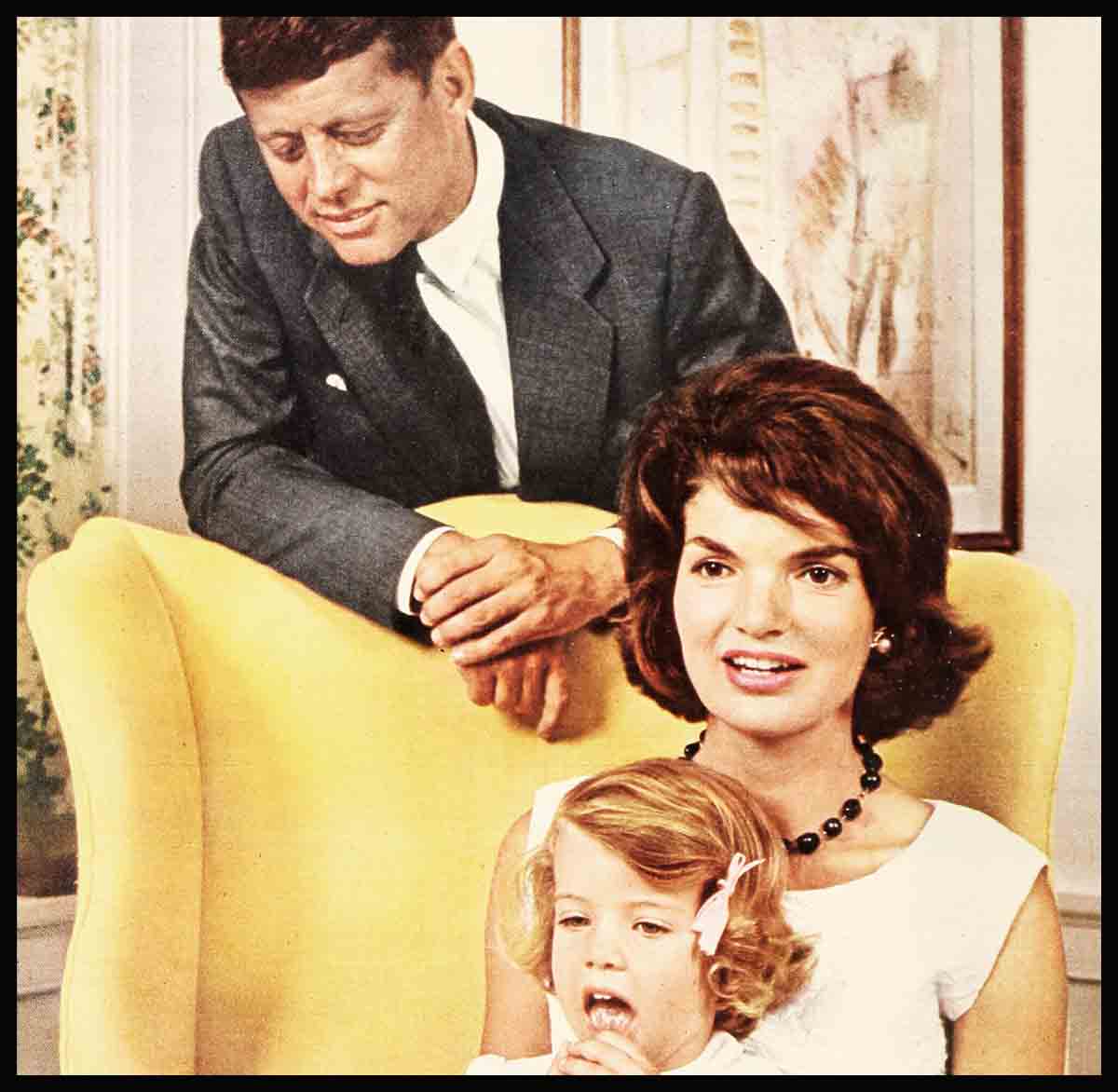

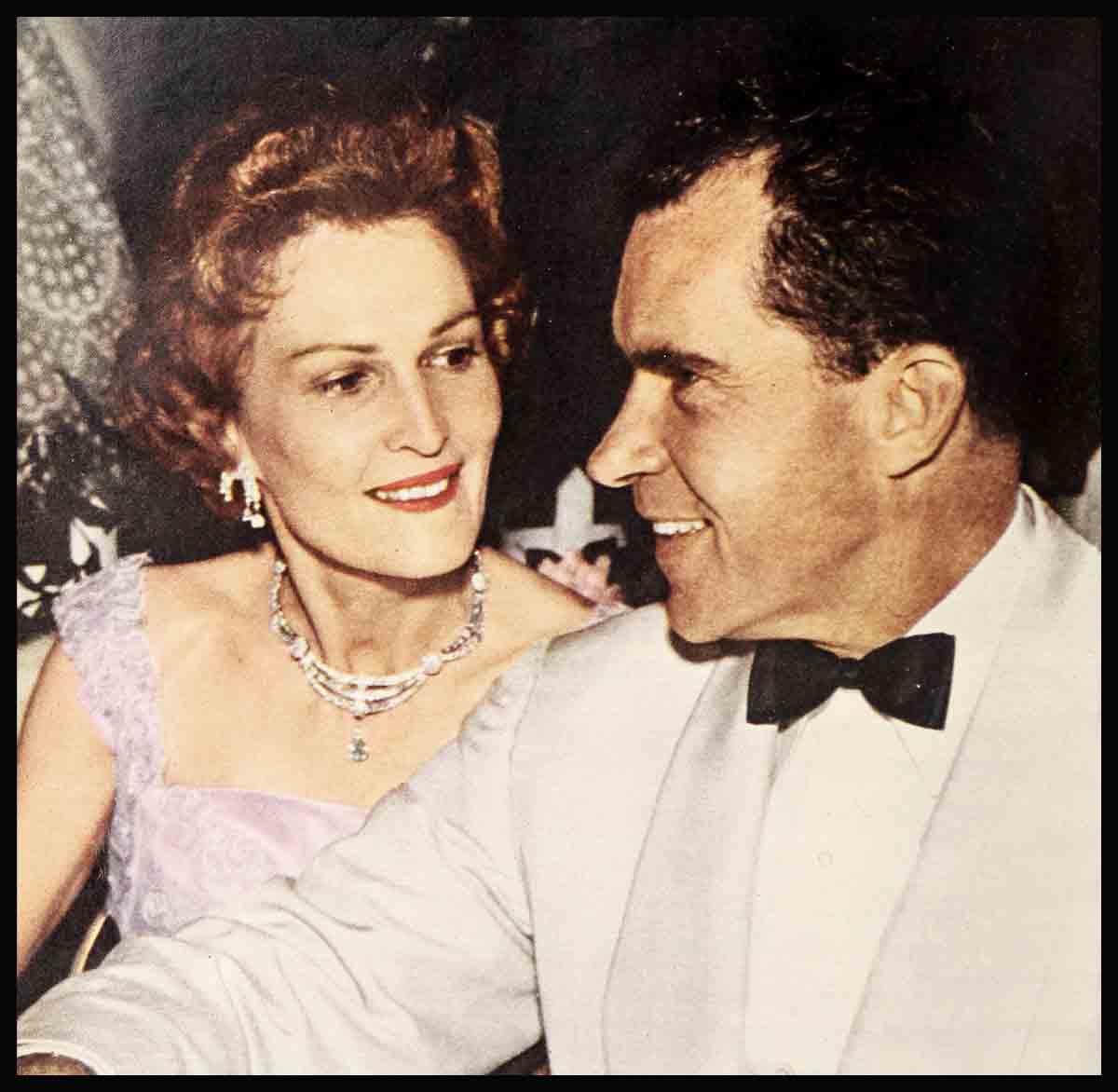
No Comments